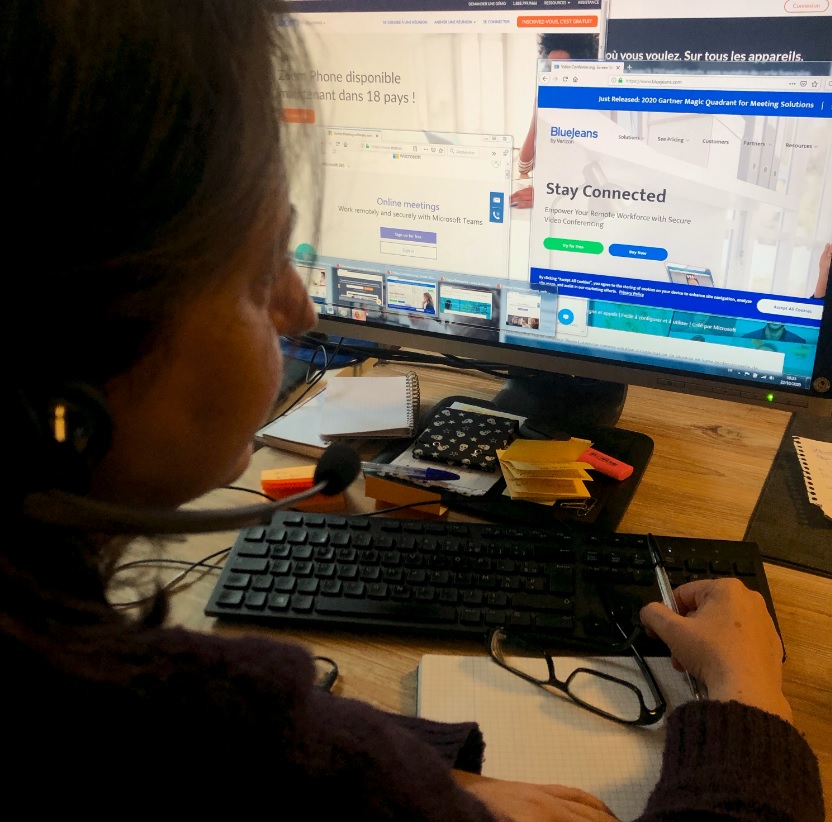A HEPEX researcher in the times of a pandemic
Contributed by Maria-Helena Ramos (INRAE)
Many of us have probably never before received so many emails starting or ending with phrases such as “I hope you are doing fine”, “Stay healthy”, “Stay safe”, “Don’t get crazy” (okay, this one maybe does not appear that often).
Probably this is what we are all trying our best to do: keep our bodies and minds in good shape, while managing research projects, operational activities, students and courses with as much attention as we still can when focus is needed. In these times of a pandemic, we are all trying to write our scientific work without locking down our revolutionary ideas or masking those uncomfortable results that often take our breath away.
Currently, in many countries and regions, people are strongly encouraged to (mostly) work from home (again). This means that, on average, we only physically meet our colleagues once or twice a week, and yet if we coordinate so well that we show up on the same day, which is definitely not what public health recommends. Most meetings go online and implicitly we are supposed to do-all-you-can-do in breaks that rarely last more than 10 minutes. By the time we switch cameras and mics off, get rid of the headphones without all the cables getting tangled on the table, and give just a short glimpse at the emails that have arrived in the past hour or so, coffee break has already become an unachievable dream and there are only 2 minutes left to put the headphones on again and hit those microphone and camera buttons, wherever they are on that new interface you have never used (or heard of) before.
A normal day during an abnormal time
Web-based videoconferencing services are an incredible prolific field, perhaps even broader than hydrological model intercomparison. I have never had to assimilate in real-time so many online tools in all my life! Under the strict confidentiality hypotheses, they are all supposed to be the perfect one-shop system for our courses, webinars, meetings or virtual happy hour get-togethers. There is a big business out there, biased or not, given the many options available. It takes time to become sharp enough to navigate through all the systems with accuracy. By the time you get there, you know for sure you are definitely not a robot. At the same time, you just find out you have some difficulties spotting every pixel forming a chimney on a photo grid of the ugliest towns you have ever seen (damn CAPTCHA!). But let’s focus: you are now connected and happy that you have worked your way in. Then you just realize, after some post-event analyses, that all these videoconferencing systems present, in fact, minimum differences in their “skill score”, particularly when it comes to making things – really – happen smoothly and reliably! But who could predict it? It is new, let’s try!
By far, the most difficult to me has been to manage the online courses and hybrid teaching. Universities are advised to reduce their attendance by half, which sometimes creates a bit of a chaos, with ensembles of student members spreading all over. Some students attend classes from home, or wherever they can get good Wi-Fi and a peaceful room to minimize the errors in their initial conditions for a successful professional life. Other students attend the lessons at the university, where they expect to follow along the best perfect deterministic guess for their uncertain future. There are, of course, a lot of real-time unexpected problems and crisis management (for instance, when my husband and I found out we have to give classes from opposite sides of the same dinner table at the same time!). Many of us are certainly making efforts to optimize space at home and control the spread of so many activities in time.
In summary, life as a researcher in a pandemic has been a chain of events, with a huge amount of information flowing and not much time for well-informed decisions to be taken. Not to mention uncertainty growing widely when it comes to planning anything more than a month ahead. Climatology has never been so wrong before! Let’s get prepared for the unexpected upcoming events!
Stay healthy and, above all, don’t get crazy!

November 12, 2020 at 02:31
Thank you Maria-Helena for this relaxing and funny, yet very actual post!
Here in March, to my great horror, many people in the medias where listing all the positive aspects of working from home, and how we should continue doing that even after the pandemic. As time was passing, we started hearing more and more about the negative aspects too. Personally, while I recognize the necessity of complying with the rules and recommandations to limit the propagation of the virus, I absolutely *hate* working from home and find it very challenging.
…But I will certainly try to not go crazy 🙂